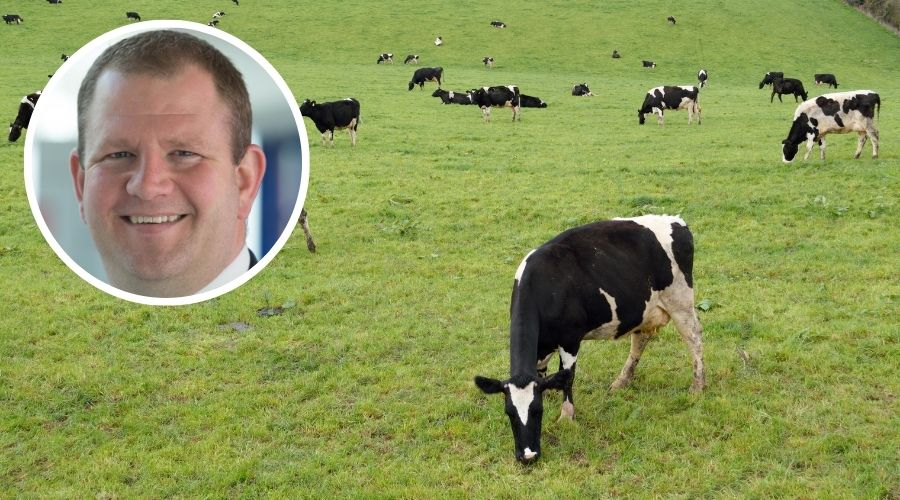IAAS worries that conditionality will be the straw that breaks beef sector’s back
9th July 2024
IAAS executive director talks about the argument over the impact of additional conditions to the Scottish Suckler Beef Support Scheme introduced by the Scottish Government three months ago.

Recently, the Institute of Auctioneers and Appraisers (IAAS) and the industry were presented with a report from SRUC, commissioned by the Scottish Government, which tried to show the conditionality would have only a minor impact on funds received by median and mean farm types, said Neil Wilson of IAAS.
He continued: “Alongside my role as the IAAS executive director, I am also a business consultant and a beef farmer. Now I might be a ‘median’ farmer, and I’ve certainly been called ‘mean’ in my time, but I know that these are not credible measurements in terms of explaining a beef farming size or system.
“Neither is the idea of pitching a 100-cow herd and then guessing about what percentage might be barren or throw a calf. The reality is that changing access to funds will impact every suckler beef farm in Scotland, but smaller farmers are likely to bear the brunt.”
Mr Wilson added that smallholders, crofters, and part-time farmers are “vital” to the beef sector and deserve proper representation and consideration. “Unfortunately, this has been neglected,” he continued.
Very real concerns
“Feedback from members’ mart customers, beef farmers from across Scotland has been overwhelmingly negative regarding the changes to the scheme. Better co-development by the government and organisations closest to the impact of the scheme could have avoided this tension.
“Many beef farmers have some anxiety about the scheme, particularly smaller enterprises that can’t justify purchasing a bull—whether it be trying to hire a bull and getting the timing right, only having one bull, and the risk that he fails to work effectively. Even with AI, there are reports of as low as 50% success rate.
“These are very real concerns. Any delay can disrupt the calving interval and jeopardise eligibility for calf scheme money,” Mr Wilson said.
The IAAS executive director added that all beef farmers, however, face similar challenges of working bulls, as well as disease challenges, weather-related issues, and more that could hinder the breeding season and therefore hit any farm at any point in time.
He said: “With this is the risk that the calf payment very quickly becomes a big round zero in year-end figures.
“Unfortunately, it appears that the Scottish Government has no appetite for a sensible and reasonable force majeure article. Neither do they seem to have the will to support all farmers, regardless of scale. On one hand, they condition a scheme that will hinder smaller farmers, while equally chasing land reform that will hurt larger farmers.”
Calf scheme conditions
“It is no wonder that the biggest issue in our sector, and I expect in rural Scotland, is a pervasive lack of confidence. Our First Minister, John Swinney, tried—and arguably failed—to convince us otherwise during his speech at the Royal Highland Show.
“IAAS members have spent the last three months feeding back to me that the Calf Scheme changes have been very poorly received on farms with widespread negative feedback on the outcome.
“Off the back of it, we have also seen an increase in dispersal sales of suckler herds in recent months.
“Thankfully, many of these breeding cattle are going back into other breeding herds as replacements, although it is unclear whether this is for expansion purposes. However, we do then lose more small herds and smaller farms, which have always been important to the rural economy and to auction marts,” he continued.
Mr Wilson said that reasons for these dispersals vary, according to conversations around the marts, with challenges such as labour shortages, succession planning, and lack of profitability all getting an airing.
However, recently, the most consistent reason has been that the introduction of the calf scheme conditions has really dented confidence and has been the straw that broke the camel’s back for some.
He added that IAAS came out strongly against the changes when they were announced in March, as the members believe it is unnecessary for an important support scheme such as this to be conditioned.
“The timing was terrible, and there is no plan for when cows calving before the announcement date actually become eligible. Our stance is rooted in the need to stabilise a declining sector rather than introduce more barriers.
“The feedback from farmers to our members has strengthened our resolve on this issue. We will continue to maintain our opposition to the scheme—mainly because we listen to and support our members and their customers, even when it’s tough to do so in the face of hefty political pressure.
“The unpragmatic changes to the calf scheme threaten the very fabric of our rural economy by undermining the confidence and viability of our beef farmers.”
Read more livestock news.


